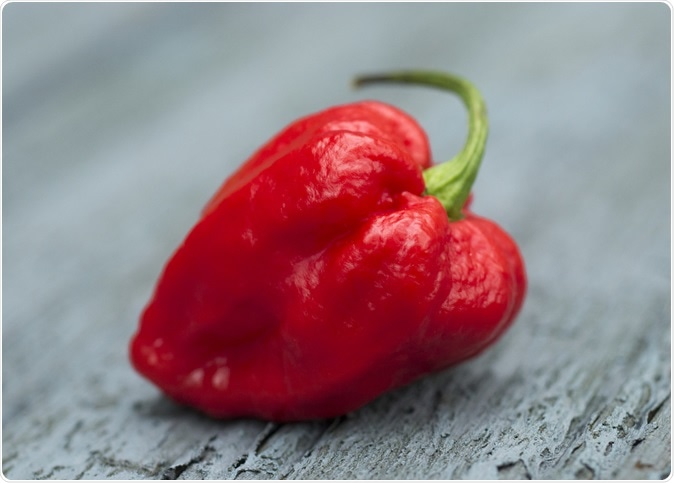An unidentified 34 year old man reportedly ate a Carolina Reaper – one of the hottest rates peppers in the world, during a contest. What followed was a series of intense headaches and retching in the man. The headaches are typically termed 'thunderclap headaches'. The case study was published this week by the doctors attending the man in the journal BMJ Case Reports.

Carolina Reaper or HP22B Cilli Pepper is the world's hottest pepper. Crossbreed between a Bhut jolokia (a former world record holder) and a red habanero. Image Credit: Lenscap Photography / Shutterstock
After eating the peppers the man developed excruciating head and neck pain and visited the emergency room at Bassett Medical Center in Cooperstown, New York. The attending doctors could not ascertain the cause behind the headaches. There were no other symptoms apart from the headache – no deficits in nerve function, weakness, paralysis, slurring of speech, loss of vision etc. These symptoms would have pointed towards a stroke. The patient underwent a CT scan of his brain that showed no signs of a stroke – bleeding or a clot obstructing a blood vessel in the brain. The doctors then performed a CT angiogram wherein they looked at the flow of blood across the brain. Therein they noted that left internal carotid artery and four other major blood vessels in the brain showed a significant narrowing or constriction. Dr. Gregory Cummings, neurologist who was looking after the man diagnosed him with reversible cerebral vasoconstriction syndrome, or RCVS that could have been caused due to the effects of the hot peppers.
Experts in the field explain that thunderclap headaches are intense headaches that arise due to intense constriction of the blood vessels in the brain. The condition resolves on its own within a few days or a few weeks. Certain drugs such as triptans or ergotamine as well as drugs of abuse including amphetamines and cocaine can lead to RCVS. RCVS can also lead to strokes where part of the brain does not receive blood supply due to intense blood vessel constriction. The likelihood of dying from RCVS is very little and most people suffer from recurrent headaches until the condition resolves say the experts.
The patient had ingested the Carolina Reaper – bred first in 2013 by Ed Currie of the Puckerbutt Pepper Company. Scoville Heat Scale measures the spiciness of chili peppers and the reaper scores around 1.5 million on this scale. This makes it 400 times spicier than jalapeño peppers (3,500 to 8,000 score).
In this case the RCVS attack was precipitated by the hot peppers. Peppers contain capsaicin which can cause constriction of blood vessels in certain parts of the body. It is used in certain ointments and lotions for medicinal purposes. There is evidence of capsaicin in high doses causing blood vessel constriction of the heart leading to heart attacks. This case is the first to show that similar blood vessel constriction can occur in the brain as well. RCVS can also occur due to extreme pain or emotions. This pain on eating the peppers could have been a reason for the RCVS in this patient.
After a few days of treatment, the patient recovered and was ready to be discharged wrote the authors. In five weeks a CT angiogram was repeated and there was no evidence of blood vessel narrowing in the patient.